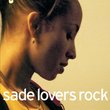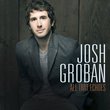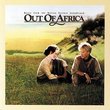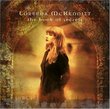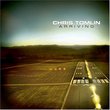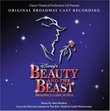| All Artists: Iva Davies, Christopher Gordon, Richard Tognetti Title: Master and Commander: The Far Side of the World Members Wishing: 0 Total Copies: 2 Label: Decca Original Release Date: 11/11/2003 Release Date: 11/11/2003 Album Type: Soundtrack Genres: Special Interest, Pop, Soundtracks Style: Number of Discs: 1 SwapaCD Credits: 1 UPC: 028947539827 |
Search - Iva Davies, Christopher Gordon, Richard Tognetti :: Master and Commander: The Far Side of the World
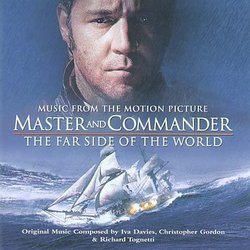 | Iva Davies, Christopher Gordon, Richard Tognetti Master and Commander: The Far Side of the World Genres: Special Interest, Pop, Soundtracks
A trio of noted Australian musicians--Iva Davies, Richard Tognetti and Christopher Gordon--composed the film's score. They previously collaborated on "The Ghost of Time," a piece commissioned for the Millennium celebration... more » ![header=[] body=[This CD is available to be requested as disc only.]](/images/attributes/disc.png?v=5b450bfd) ![header=[] body=[This CD is available to be requested with the disc and back insert.]](/images/attributes/disc_back.png?v=5b450bfd) ![header=[] body=[This CD is available to be requested with the disc and front insert.]](/images/attributes/disc_front.png?v=5b450bfd) ![header=[] body=[This CD is available to be requested with the disc, front and back inserts.]](/images/attributes/disc_front_back.png?v=5b450bfd) |
Larger Image |
CD DetailsSynopsis
Product Description A trio of noted Australian musicians--Iva Davies, Richard Tognetti and Christopher Gordon--composed the film's score. They previously collaborated on "The Ghost of Time," a piece commissioned for the Millennium celebrations in Sydney, which came to the attention of Peter Weir. The director was so impressed, he played the piece on the Master And Commander set throughout production, and he asked its creators to write the music for his movie. The score interweaves "Old World" and "New World" music, reflecting the talents and backgrounds of its composers. Iva Davies hails from both pop and classical traditions; Richard Tognetti, one of the world's great violin virtuosos, taught Russell Crowe the ins and outs of the instrument; and film/television composer Christopher Gordon brought orchestral texture to the project. Given the period, it comes as no surprise that the score is infused with source music from Bach (Cello Suite) and Mozart, among other great classical composers. Percussion dominates portions of the score. "Drums signal the forward movement of the ship," says Davies, "that it's on a mission. It brings you back into the action." The score's biggest surprise comes with its use of synthesizers. "Peter doesn't make films in the expected way," says Davies, "and for that reason we wanted the score to be not what everyone expected. Peter wanted some scenes to have what I call a kind of 'futuristic' sense"--conveying the idea that these 19th century sailors were cutting-edge explorers. Similarly Requested CDs
|
CD ReviewsAn Effective and Commanding Score G M. Stathis | cedar city, utah USA | 11/13/2003 (4 out of 5 stars) "Usually when a film score is described as "effective" or "based on musical idioms rather than melody" you end up with a score that may work on the screen but is a disappointment as a soundtrack. When film director and composer also rely upon "source matertial" or classical excerpts the problem is generally compounded. The score for Peter Weir's "Master and Commander" is, however, something of an exception to all that. Here is a musical treatment by committee that succeeds by sailing against existing currents. The original orchestral music is by Iva Davies, Christopher Gordon and Richard Tognetti. But a good deal of "source material": Mozart, Vaughn Williams, Corelli, and Boccherini (on the soundtrack) is used especially since two of the main characters are musicians as well as sea-captain and ship's surgeon. In fact, it all works very well both as a dramatic score and as a soundtrack album. The original score does depend on idioms rather than melodies, unlike Korngold's "The Sea Hawk or even Horner's "Perfect Storm," but the composers are quite masterful in capturing the moment, whether it is dramatic, mysterious, or militant. The use of percussion is quite effective and somewhat unexpected. The musical atmosphere for "Master and Commander" is clearly tinged by sea spray and a touch of gunpowder. Amazingly, the collection provides an album that is very nice to listen to. Ably produced and packaged by Decca." A True Musical Delight! T. George | An American city | 01/14/2004 (5 out of 5 stars) "As I sit here listening to this soundtrack, I felt I should really add my 2 cents here. I'm not much of a soundtrack buyer, though there are exceptions. I absolutely loved a tribal song in "Thin Red Line," and bought the soundtrack based on that one song. It was a mistake though. The rest of the soundtrack was just slow & moody - effectively building the atmosphere for the movie but depressing to listen to. (In my opinion.)All that said, I made the same decision again for this soundtrack. I loved the last movement they played in the movie & couldn't get it out of my head. Thus, I took a plunge & went for the soundtrack.What I found was a true musical gem. It does have some of the mood building scene pieces that "Thin Red Line" and other soundtracks employ. However, interspersed with this are some old folk melodies & delightful bits of Corelli, Bach, & Boccherini (to name a few). I was delighted to learn how much I enjoyed classical pieces highlighting the violin & cello. Most of what I listen to tends to be full orchestral pieces, but I definitely want to look more into this type of music. All the more so, I feel deeply that the balance of mood-building pieces, folk pieces & classical pieces capture the spirit of the books & the movie in unexpected ways. It swings from low, somber tones to light & hope-filled pieces to joyful dancing tunes...effectively showing the constant triumph of the sailors' spirit over their frequent danger & despair. Yes, there were many dark times, but the same instruments that create the dark atmosphere suddenly pull together in a new score, turning around an oppressive situation. I find listening to the sound-track to be very soulful but also hopeful.My one criticism is that they often cut short the classical pieces. Perhaps this is for the flow of the entire soundtrack, but I do long for more. Overall, however, I definitely recommend this soundtrack." Should've won an Oscar. Joanne Long | Murphysboro, IL United States | 03/16/2004 (5 out of 5 stars) "The use of classical music in the "Master" soundtrack is inspired. Yo-Yo Ma's playing of the first of J.S Bach's Unaccompanied Cello Suites seems perfect for the scenes on the Galapagos Islands. The snippets of Mozart's Violin Concerto # 3 and Boccherini's sublime "Musica Notturna" are well chosen as the music played by the captain and the doctor.Those eager to hear more by Baroque composer Luigi Boccherini, whose swoon-worthy piece, "Passacalle," closes the movie, will find what seems to be the original recording of it on the CD "Respighi: Fontane di Roma, Pini di Roma," by the Berlin Philharmonic, directed by Herbert Von Karajan. The last five tracks are Boccherini's "La Musica Notturna Delle Strade di Madrid" op.30 No.6, including "Passacalle." That's the danceable, contemporary-sounding number at the end of the movie, the one in which Paul Bettany and Russell Crowe pick up their instruments and strum them like guitars, and Bettany (or his counterpart in the Berlin Philharmonic)launches into a passage high on the top string.For those who wish to hear more of Mozart's violin concertos, several great recordings are available, one by Arthur Grumiaux with the London Symphony Orchestra. Listen to the third movement for the passage used so effectively in one of the captain-doctor jam sessions."
|

 Track Listings (13) - Disc #1
Track Listings (13) - Disc #1